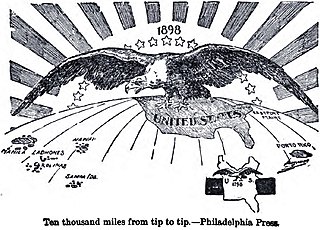
Cultural imperialism comprises the cultural dimensions of imperialism. The word "imperialism" describes practices in which a country engages culture to create and maintain unequal social and economic relationships among social groups. Cultural imperialism often uses wealth, media power and violence to implement the system of cultural hegemony that legitimizes imperialism.

Colonialism is the pursuing, establishing and maintaining of control and exploitation of people and of resources by a foreign group of people. Implemented through the establishment of coloniality and possibly colonies, this colonization keeps colonized territory and people socio-economically othered and subaltern to colonizers and their metropole. While frequently advanced as an imperialist regime, colonialism can also take the form of settler colonialism, whereby colonial settlers invade and occupy territory to permanently replace an existing society with that of the colonizers, possibly towards a genocide of native populations.

Imperialism is the practice, theory or attitude of maintaining or extending power over foreign nations, particularly through expansionism, employing both hard power and soft power. Imperialism focuses on establishing or maintaining hegemony and a more or less formal empire. While related to the concepts of colonialism, imperialism is a distinct concept that can apply to other forms of expansion and many forms of government.
Mughal or Moghul may refer to:

In historical contexts, New Imperialism characterizes a period of colonial expansion by European powers, the United States, and Japan during the late 19th and early 20th centuries. The period featured an unprecedented pursuit of overseas territorial acquisitions. At the time, states focused on building their empires with new technological advances and developments, expanding their territory through conquest, and exploiting the resources of the subjugated countries. During the era of New Imperialism, the European powers individually conquered almost all of Africa and parts of Asia. The new wave of imperialism reflected ongoing rivalries among the great powers, the economic desire for new resources and markets, and a "civilizing mission" ethos. Many of the colonies established during this era gained independence during the era of decolonization that followed World War II.

American imperialism is the expansion of American political, economic, cultural, media, and military influence beyond the boundaries of the United States of America. Depending on the commentator, it may include imperialism through outright military conquest; gunboat diplomacy; unequal treaties; subsidization of preferred factions; regime change; or economic penetration through private companies, potentially followed by diplomatic or forceful intervention when those interests are threatened.
Timurid refers to those descended from Timur (Tamerlane), a 14th-century conqueror:
Diwan and divan are terms originally used in Persian, Arabic, and Turkish with derivatives in other Asian and European languages such as diwaan, dewan, etc.. These terms may refer to:

Udham Singh was an Indian revolutionary belonging to Ghadar Party and HSRA, best known for assassinating Michael O'Dwyer, the former lieutenant governor of the Punjab in India, on 13 March 1940. The assassination was done in revenge for the Jallianwala Bagh massacre in Amritsar in 1919, for which O'Dwyer was responsible and of which Singh himself was a survivor. Singh was subsequently tried and convicted of murder and hanged in July 1940. While in custody, he used the name 'Ram Mohammad Singh Azad', which represents the three major religions in India and his anti-colonial sentiment.
Kush or Cush may refer to:
Bengal Province or Province of Bengal, may refer to the Imperial Province of the Bengal region under two periods of imperial rule in South Asia:
India is a country in South Asia.

The historical phenomenon of colonization is one that stretches around the globe and across time. Ancient and medieval colonialism was practiced by the Phoenicians, Greeks, Romans, Turks, Han Chinese, and Arabs.
Imperial Italy may refer to:

The historiography of the British Empire refers to the studies, sources, critical methods and interpretations used by scholars to develop a history of the British Empire. Historians and their ideas are the main focus here; specific lands and historical dates and episodes are covered in the article on the British Empire. Scholars have long studied the Empire, looking at the causes for its formation, its relations to the French and other empires, and the kinds of people who became imperialists or anti-imperialists, together with their mindsets. The history of the breakdown of the Empire has attracted scholars of the histories of the United States, the British Raj, and the African colonies. John Darwin (2013) identifies four imperial goals: colonising, civilising, converting, and commerce.
William Roger Louis CBE FBA, commonly known as Wm. Roger Louis or, informally, Roger Louis, is an American historian and a professor at the University of Texas at Austin. Louis is the editor-in-chief of The Oxford History of the British Empire, a former president of the American Historical Association (AHA), a former chairman of the U.S. Department of State's Historical Advisory Committee, and a founding director of the AHA's National History Center in Washington, D. C.
American Empire may refer to:

Anti-imperialism in political science and international relations is opposition to imperialism or neocolonialism. Anti-imperialist sentiment typically manifests as a political principle in independence struggles against intervention or influence from a global superpower, as well as in opposition to colonial rule. Anti-imperialism can also arise from a specific economic theory, such as in the Leninist interpretation of imperialism, which is derived from Lenin's 1917 work Imperialism, the Highest Stage of Capitalism. People who categorize themselves as anti-imperialists often state that they are opposed to colonialism, colonial empires, hegemony, imperialism and the territorial expansion of a country beyond its established borders.
Indian Empire may refer to:







